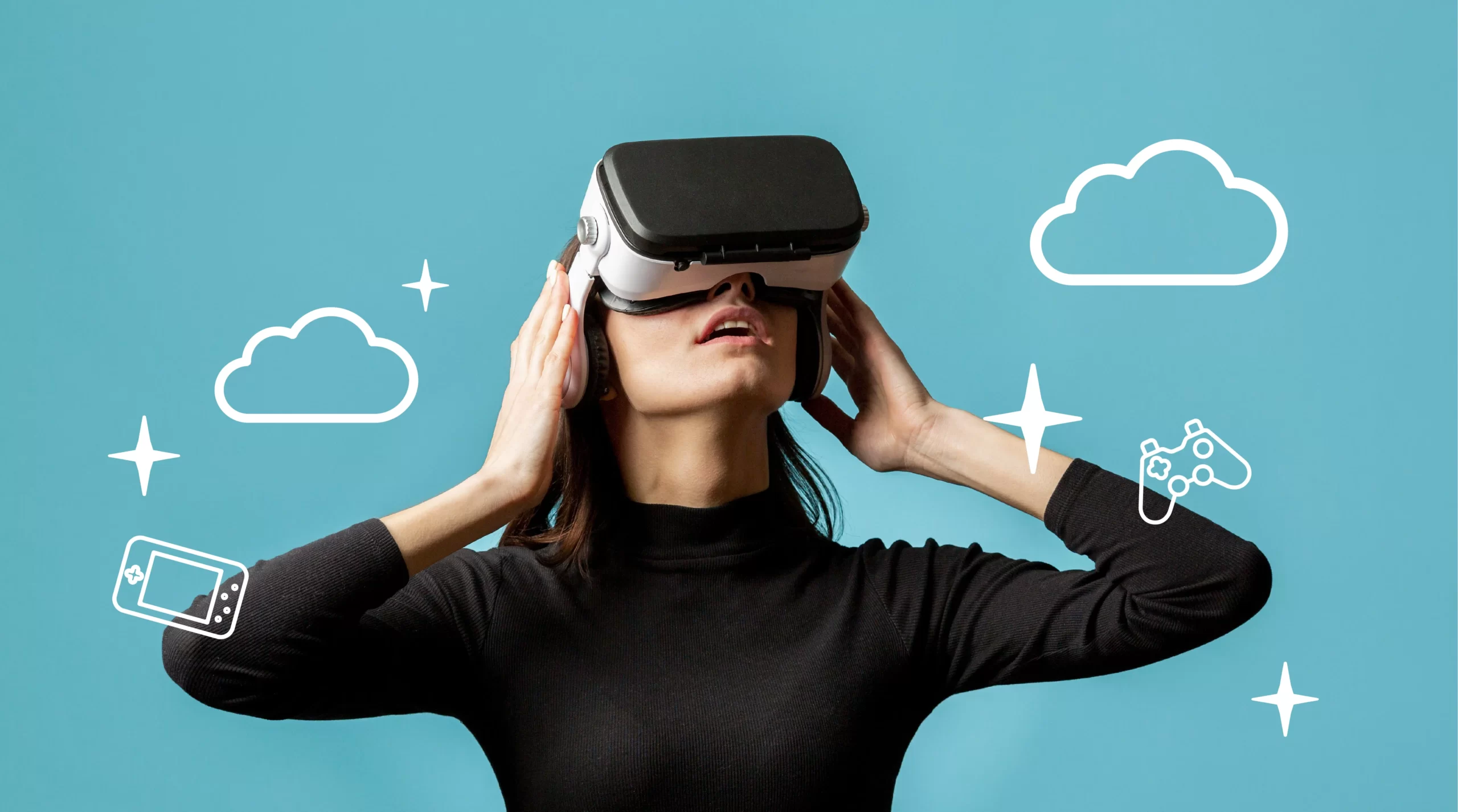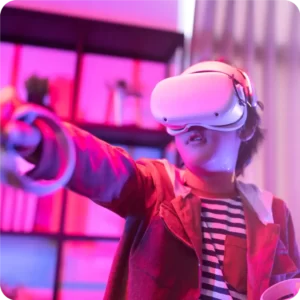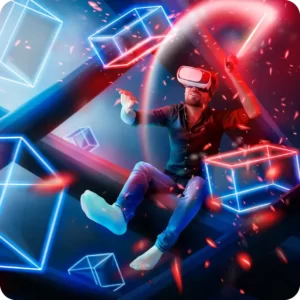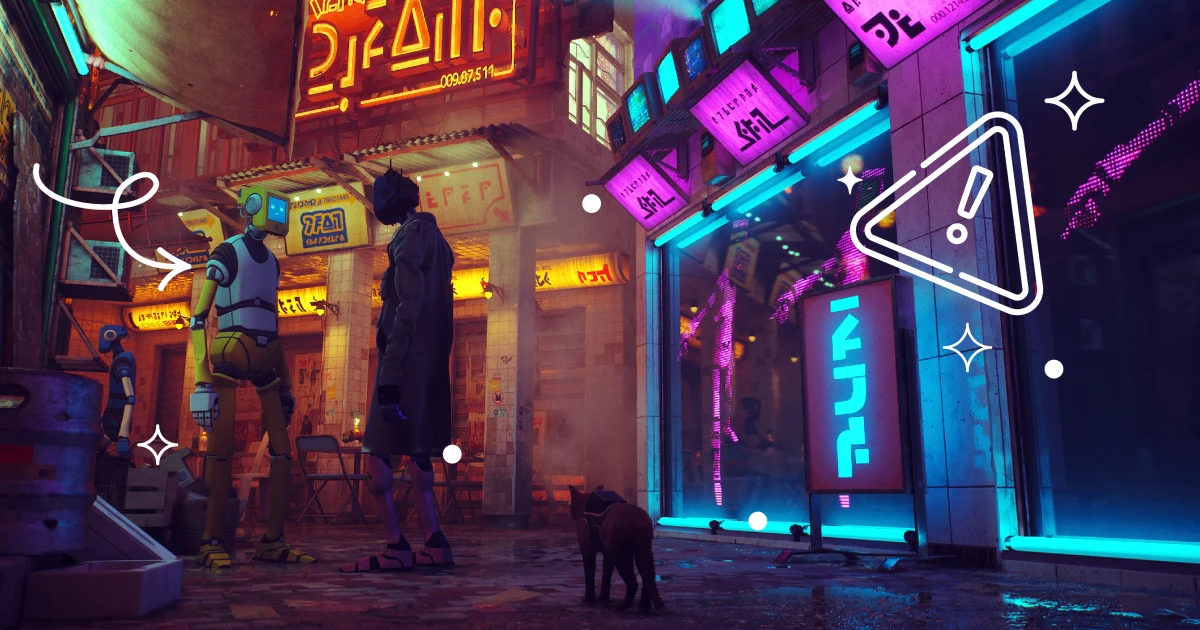Virtual Reality (VR) is an advanced technology that enables the creation of an interactive virtual environment for users. In this space, users can directly interact with the virtual world using VR devices such as headsetsor goggles and control equipment like handsets and controllers,experiencing the feeling of being truly immersed in that world.
The technology of virtual reality is comprised of a combination of smartphones, displays, sensors, and advanced control devices. These devices include motion sensors, eye sensors, and audio sensors to provide users withaccess to a realistic and interactive experience in the virtual world.
With this technology, users can enter various environments and scenarios and interact with them.
These environments can include games,educational experiences, social virtual environments, and even recreational environments such as cinemas or museums. Since virtual reality provides unparalleled capabilities for creating a more realistic virtual world experience,it is widely used in the gaming industry.
This technology allows game developers to create more amazing, exciting,and realistic gaming experiences for players, which would have been impossible without the use of virtual reality.
Main Usages
Virtual Reality (VR) in gaming, as an innovative and captivating technology, has multiple applications that enhance players’ immersive and thrilling experiences. Below are some of the main applications of virtual reality in gaming:
Immersive Experience
Virtual reality enables game developers to create games that provide users with a fully immersive and realistic experience in the virtual world. This enhances excitement and enjoyment for players.
High Interactivity
VR allows game developers to design games that elevate players’ interaction with the virtual world. This interaction includes the use of motion-based control devices, handheld controllers, and even body motion sensors.
Exciting Gameplay
The possibility of experiencing more thrilling and immersive gameplay is another advantage of virtual reality. This increases players’ engagement and motivation to continue playing.
Creating Extensive Virtual Worlds
Using virtual reality, game developers can create vast and expansive virtual worlds that allow players to freely roam and experience unique adventures.
Social Experience
Virtual reality enables game developers to design games that allow players to create events and social experiences in the virtual world. This fosters new and exciting connections between players.
The significant impacts of virtual reality on the gaming industry
Virtual Reality (VR) is among the technologies that have had a significant impact on the gaming industry and continue to evolve and advance. Below are some of the key impacts of VR on the gaming industry:
Enhanced Innovation and Creativity
VR enables game developers to design and create games with new and innovative experiences. This technology allows them to implement new environments, engaging storylines, and more creative ideas in their games.
Expansion of New Game Markets
VR expands the market for new and diverse games. This technology enables developers to introduce various gaming experiences to the market and attract individuals looking for new and innovative experiences.
Increased Revenue and Profitability
VR, as a popular and engaging technology, provides a large market for the gaming industry. By creating engaging and immersive experiences, it can help increase sales and revenue for games and developers.
Challenges and obstacles
However, while Virtual Reality (VR) is recognized as an innovative and powerful technology in the gaming industry, it still faces challenges and obstacles that need to be addressed. Below are some of these challenges and obstacles:
High Costs
Developing VR games requires significant investment and costs. Developing a VR game with advanced technologies and hardware requires extensive work such as designing 3D
environments and optimizing game functions, all of which are costly.
Quality Control and Performance
Due to the complexity of VR games, controlling the quality and performance of the game can be a major challenge. This includes optimization for different VR devices, debugging technical issues, and ensuring an optimal and smooth experience for players.
Uncomfortable User Experience
Some VR devices may be heavy or uncomfortable, resulting in an unpleasant and uncomfortable user experience. Additionally, some individuals may experience issues such as headaches or blurred vision due to the dimensions and heavy features of VR devices.
Technological Limitations
The technologies used in VR devices are still in their early stages and may face limitations
such as image clarity, frame rate, responsiveness, and motion sensitivity, all of which directly affect players’ experiences.
Lack of Content
Although some VR games have been introduced, there is still a lack of content and quality, extensive games that can meet all players’ expectations.
Design Challenges
Designing a VR game requires specific planning and design, including creating beautiful and realistic 3D environments,
player movement and interaction controls, and creating engaging and immersive experiences.
Social impacts
Virtual Reality (VR) not only has a significant impact on players’ gaming experiences but also notably influences their social experiences. Below are some of the social impacts that virtual reality has on players:
Human Interaction in Virtual Space
Using VR devices, players can interact with others in virtual spaces, talk to them, and even feel a sense of real presence in a completely virtual environment. These experiences can strengthen the sense of social connection and community.
Creation of Online Communities
Virtual reality creates active and dynamic online communities where individuals can interact with each other, share ideas, and engage as a community.
New Social Experiences
With virtual reality, players can experience new social experiences that would be impossible in the real world. This includes participating in virtual ceremonies and events, virtual travel to distant places, and engaging in various social activities.
The future of virtual reality in gaming
The future of Virtual Reality (VR) in gaming is of great interest to many developers and industry professionals as it promises significant advancements in the gaming industry. Below are some aspects of the future of VR in gaming:
Technological Development and Advancement
With the advancement of technology and the evolution of VR equipment and devices,
it is expected that the VR gaming experience will improve and reach a new level of realism and interaction. making the gaming experience much more engaging for players.
Creation of New Game Titles
The future of virtual reality in gaming involves creating new and innovative titles
in the gaming world, leading to the development of exciting and enduring games with unique experiences.
Expansion of VR in Multiplayer Games
The use of virtual reality in multiplayer games and the transfer of the gaming experience to a new level of collaboration and interaction among players will be realized.
Development of VR Content
Creating diverse and extensive content for virtual reality devices, including entertaining, recreational,
and educational games, will play a crucial role in attracting audiences and increasing acceptance of this technology.
Use in Other Industries
In general, the future of virtual reality in gaming not only contributes to the development of
this industry but also the capabilities and features of this technology can be used in other industries such as education, product design,
medicine, etc., playing an important role in their advancement.








